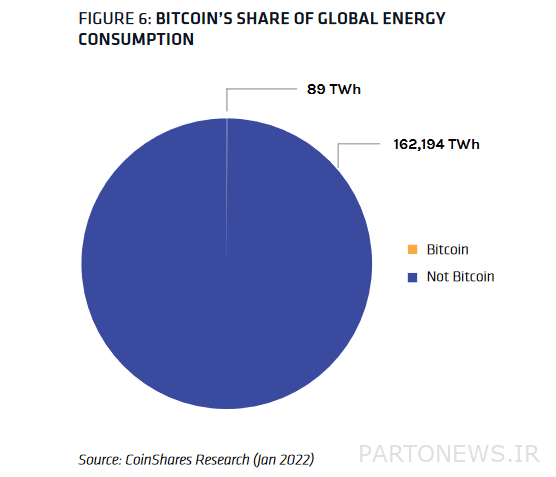Recent research: The share of bitcoin mining in global carbon emissions is close to zero

The results of new research show that the rate of carbon dioxide emissions and power consumption in the Bitcoin network, compared to other industries and the overall consumption of the world, is so low that it can be completely ignored.
To Report Crypto News, data from CoinShares analytics platform show that bitcoin mining accounts for only less than 0.08% of the world’s total carbon dioxide (CO2) emissions. According to the data, bitcoin owns only a small portion of the world’s total carbon dioxide emissions compared to other types of services using digital currencies.
Bitcoin mining has produced about 36 million tons in 2020 and 41 million tons in 2021 carbon dioxide. The study estimates that the industry’s carbon emissions have been reduced by 2.1 million tonnes as miners try to reduce their use of fossil fuels. This reduces the total carbon emissions from bitcoin mining to about 39 million tons per year.
However, even at this stage, the bitcoin network has a small share of the world’s total carbon emissions, which, according to Kevin Shears, is even less than 0.08 percent.
Part of this report states:
According to the reference data, countries with large industrial centers such as the United States and China released the equivalent of 5,830 and 11,580 million tons of carbon dioxide in 2016, respectively.
In addition, as Quinn Shears statistics show, the carbon emissions from bitcoin mining can hardly match the number of traditional industries responsible for emitting significant amounts of carbon around the world.
Kevin Shears wrote in his research:
It is estimated that carbon emissions from money printing are about 8 million tons per year, and the gold industry also emits between 100 and 145 million tons of carbon dioxide per year.
Kevin Shears also said that bitcoin mining with an annual energy consumption of 89 TWh (TWh) accounts for about 0.05% of the total energy consumed worldwide.
According to the Kevin Shears report, the use of various energies in the Bitcoin network is at its most balanced level in history. The company estimates that by December 2021, coal, gas, hydropower, nuclear energy, and wind energy accounted for 35, 24, 21, 11, and 4 percent of energy production, respectively. The remaining 5% of energy sources also contain very small amounts of oil, solar energy and other renewable energy sources such as geothermal energy.

The report states that by the 2040s, the next 20 years, more than 99% of the total bitcoin supply will be mined. At that time, the maximum amount of energy consumption will be due to the need to perform transactions within the Bitcoin network, and the energy cost of these transactions will be provided through the fees paid by the users to the miners.
Considering that bitcoin mining will be a 100% renewable industry if 100% of the renewable resources are used for this network, it can be said that instead of suppressing the development of this financial technology, we should focus on renewable energy production infrastructure.
Kevin Shears has argued that the cost of bitcoin carbon offsets should be analyzed on a long-term scale; Because in this case, the low costs of carbon emissions compared to its benefits will be determined.
Kevin Shears added:
With only 0.08 percent of the world’s total carbon dioxide emissions, eliminating the mining industry altogether, meeting global demand and depriving hundreds of millions of people of their only hope of a fair and accessible form of money would be nothing more than a mistake. .
Kevin Shears claims in the report that Bitcoin is an international, free, anti-censorship and anti-inflationary monetary network that helps protect human rights around the world.
Kevin Shears writes:
Despite this, we believe that adding a very small percentage to the world’s total carbon emissions is well worth the cost. It can be clearly seen that hundreds of millions of global Bitcoin users are all voluntarily paying for network energy costs, while also considering the use of alternative energies.
The findings of this study are consistent with a recent statement by Michael Saylor, CEO of Microstrategy. Silver claimed in a recent statement that the total amount of energy required to extract bitcoins was a “trivial figure.” Silver said in a quarterly briefing at the Bitcoin Mining Council that the digital currency consumes very little energy compared to other large industries and does not count at all compared to the total energy consumption in the world.
According to data collected by the Bitcoin Mining Council last month, global bitcoin mining consumes only 3.2 percent of the total energy wasted annually on the US grid. The organization also claims that the share of bitcoin mining in the world’s total energy consumption is 0.142 percent, while nearly 59 percent of all bitcoin miners now use renewable energy.

